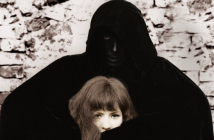Cast: Robbie Beniuk, Patrick Mitchell, Amy Landon
Director: Mann Munoz
Country: USA | Canada
Genre: Adventure
Official Trailer: Here
Editor’s Notes: The following review is part of our coverage of the Reel Indie Film Festival. For more information on the festival visit http://reelindiefilmfest.com/ and follow the event on Twitter at @RIFF_Toronto. The Legend of Jimy Lazer screens on Saturday, October 19 at The Royal in Toronto.
Being a great filmmaker is not as simple as being a film fan. You can watch hours upon hours of film by all of the greatest directors to ever practice the medium, and when handed a camera you can still produce absolute garbage. While film is certainly a business, many people seem to be losing grasp of the fact that film is art. The artist must possess a voice of their own and a reason to speak up. With the advances in digital, the increased availability of equipment and the accessibility of the internet, many of the boundaries separating the would-be filmmaker from an audience are being diminished. It leaves me conflicted, for any film fan must support a growing of the medium, but with every morsel of greatness comes a mound of filth. The Legend of Jimi Lazer is just another rotting piece in that pile.
The Legend of Jimi Lazer gets lost in a fog of homage. The film is a conglomeration of influence that lacks a guiding hand. Director Mann Munoz spends so much time infusing the film with tricks and themes that he has seen elsewhere, that he robs the film of its own voice.
Jimi Lazer (Robbie Beniuk), front-man of the band Lazer Us, craves fame. He yearns for the cries of adorning fans so much that he is willing to pay the ultimate price. When a mysterious woman offers him the chance at celebrity on par with Jimi Hendrix, he scoffs at her price and snatches up the magical guitar. A last minute change of heart stops Jimi before executing the deal. Twenty-seven years have elapsed, and no one has seen Jimi since that last decision. Freedom (Patrick Mitchell), his former manager, is the only one that is able to find him. With a dream his inspiration, Freedom urges Jimi to return to the world, make his dream come true and break the long gestating curse.
The influence of film upon itself is inevitable. It is a medium that builds upon itself and filmmakers, with the unspoken requirement of an appreciation of film, often utilize elements from other works in the crafting of their stories. This building, however, must be used in support of a vision. Like tools, they assist in the construction of a final product; they should not be the material. The Legend of Jimi Lazer gets lost in a fog of homage. The film is a conglomeration of influence that lacks a guiding hand. Director Mann Munoz spends so much time infusing the film with tricks and themes that he has seen elsewhere, that he robs the film of its own voice.

The film feels altogether confused. Bouncing from supernatural, to B-horror, and back to film noir, all captured with a low-rent Lynchian slant, it is at conflict with its own sensibilities. The low-budget actors do a serviceable job with the material, and the amateur acting only occasionally drifts into the distractingly awful. Robbie Beniuk does his best to imbue Jimi Lazer, who always feels like a lost and cheap Uncle Jesse, with mystery and cool. As hard as the actors are trying to make it work, the problems existed far before they started reading the lines. The plot is unnecessarily confusing, and the characters act in slavish service to it. There is little room for character development when the actors are hurriedly attempting to make sense of the convoluted story. They rush from scenes because it tells them to on the page and Jimi experiences growth only when it is convenient to the establishment of a happy ending.
The film begins with strong conviction, establishing a spooky tone that is subtle and successful more often in what it leaves unsaid. Nevertheless, as the plot kicks in, it all becomes exceptionally crowded. What began as ominous and captivating devolves into the ridiculous, and the opening exists as little more than a promising short. Segments become overpowered by lackluster editing, a mishmash of every kind of transition imaginable, far-too numerous chapter titles that are altogether unnecessary (unless intended for use on a DVD release), and, most surprisingly, glaringly poor font choices. The mess of cosmetic additions attempt to distract from the tonal imbalance. The audience is never sure if they should be taking this seriously, or reveling in the low-budget trickery. I was even onboard with its overt recognition of the creepy importance of the number 27 in the music industry; that is until it used a quote from Paul McCartney, a musician who is living large at 71 (throwing in an onscreen question mark does not forgive this). By the time the film reaches the end of its slim 92-minute runtime, it seems just as exhausted with itself as we are with it. The saccharine, out-of-place, and heavy-handed ending is rushed, and the emotional conclusion unearned.
The film begins with strong conviction, establishing a spooky tone that is subtle and successful more often in what it leaves unsaid. Nevertheless, as the plot kicks in, it all becomes exceptionally crowded. What began as ominous and captivating devolves into the ridiculous, and the opening exists as little more than a promising short.
I still have yet to decide how I feel about the films that are awful simply for the sake of being awful. Syfy and Asylum celebrate the poor quality, and there has been a resurgence of grindhouse sensibilities in plenty of new releases. The cheap and fast films of this genre have their place in film history, but the persistent revisiting is just spinning wheels. This is only one of the many fields that The Legend of Jimi Lazer tries to play in, that is, only when it finds it convenient. There are moments of intrigue that show great promise, especially as the film begins, but it soon gets lost in itself. The messy plot hinders the already mediocre acting. Additionally, long stretches of the film are far from visually pleasing and play like little more than a motion comic. Director Mann Munoz has attempted to make a film that combines elements of, what I can only imagine all of his favorite cinematic moments and themes, making for a truly odd and unsatisfying viewing experience. The saying goes that a camel is a horse designed by committee, filled with compromises and a loss of vision. The Legend of Jimi Lazer is one big camel.
[notification type=”star”]42/100 ~ BAD. Director Mann Munoz has attempted to make a film that combines elements of, what I can only imagine all of his favorite cinematic moments and themes, making for a truly odd and unsatisfying viewing experience. The saying goes that a camel is a horse designed by committee, filled with compromises and a loss of vision. The Legend of Jimi Lazer is one big camel. [/notification]



